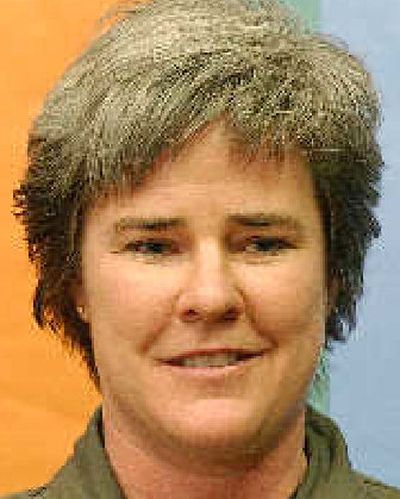Lesbian reservist goes to court

SEATTLE – Saying that the U.S. Constitution trumps military regulations, attorneys for lesbian Air Force Reserve Maj. Margaret Witt on Wednesday sought a federal injunction to prevent the service from kicking her out.
“We recognize we have our work cut out for us,” said pro-bono attorney Jim Lobsenz. But he said Air Force regulations and this particular statute are unconstitutional.
It is illegal discrimination to ban homosexuals from military service, said another of Witt’s lawyers, American Civil Liberties Union attorney Aaron Caplan.
“The United States should not give effect to prejudice,” Caplan said. “There are people in the military who are likely bigots, who don’t like black people. We don’t give in to them.”
The case was filed Wednesday in U.S. District Court in Tacoma.
Supporters of the current policy argue that there are legitimate reasons for it. Given the military’s close living conditions, said Center for Military Readiness President Elaine Donnelly, Congress overwhelmingly decided that it wouldn’t be appropriate to force people to expose themselves to people sexually attracted to them.
“We don’t expect women to routinely bed down and shower” with men they work alongside, she said. “The law basically reflects the desire for human modesty.”
And the courts have historically deferred to the military regulations, she said.
“The armed forces are different from the civilian world,” Donnelly said.
Witt and her lawyers take hope, however, from a 2003 Supreme Court decision ruling a Texas sodomy law unconstitutional.
“Liberty presumes an autonomy of self that includes freedom of thought, belief, expression, and certain intimate conduct,” Justice Anthony Kennedy wrote in the majority opinion in Lawrence v. Texas.
Witt’s case mirrors a still-pending 2004 Massachusetts suit by a dozen homosexual military members seeking reinstatement. Both lawsuits argue that the ban and the military’s “don’t ask, don’t tell” regulations violate the constitutional rights to due process and free speech.
“The ‘don’t ask, don’t tell’ policy says you can believe these things in your heart but you can’t act on them,” said Caplan. “The Lawrence case says ‘Get real.’ “
Dressed in her Air Force flight suit, Witt faced a phalanx of reporters and news cameras in a Seattle law office Wednesday. She showed them medals and commendations, including one for saving the life of a 60-year-old Defense Department worker who collapsed midflight. Her photo is featured in two recruiting pamphlets for the Air Force nursing program.
A Pacific Lutheran University graduate, Witt joined the Air Force in 1987 after a short stint as an operating-room nurse at Tacoma General Hospital. An active-duty officer for nine years, she became a reservist in 1995. In civilian life, she’s a physical therapist in Spokane.
In the summer of 2004, someone apparently told the Air Force that Witt was a lesbian. In a subsequent interview with an Air Force investigator, a civilian woman said that she and Witt “had engaged in a committed and loving relationship from July 1997 through October 2003,” according to court paperwork.
On Nov. 4, 2004, Witt was called to her commander’s office at McChord Air Force Base. The commander told Witt to stop reporting for reservist duty. The Air Force was discharging her “on grounds of homosexual conduct.” Witt was told to pack up her office immediately and leave. Witt said she was stunned and speechless.
“My unit was my extended family, and the Air Force was my extended family,” she said. “I miss it very much … It’s devastating.”
Her attorneys have interviewed 10 of her colleagues at the 446th Aeromedical Evacuation Squadron.
“They don’t understand why this is being done,” said Lobsenz. “They want her back.”
“In fact, a lot of them thought she was gay,” said Caplan. “Adult woman, never talks about men. And that was fine with them. They didn’t care.”
Capt. Jennifer Gerhardt, a spokeswoman for McChord’s 446th Airlift Wing, said she couldn’t discuss the case.
“I can’t really comment because of the Privacy Act,” she said.
As Witt’s attorneys pointed out, many of America’s military allies allow openly gay or lesbian troops to serve. Among them: Australia, Canada, Israel, Britain and the Netherlands.
Donnelly’s response: “We do not take our law from foreign governments.”
Witt is also appealing to the Air Force’s Administrative Discharge Board, which is expected to convene a hearing in Georgia soon. But her lawyers say there’s little reason for hope there. Under Air Force regulations, they said, the board’s main focus will be to decide whether Witt is a lesbian or not. “Nobody’s denying that,” said Lobsenz.